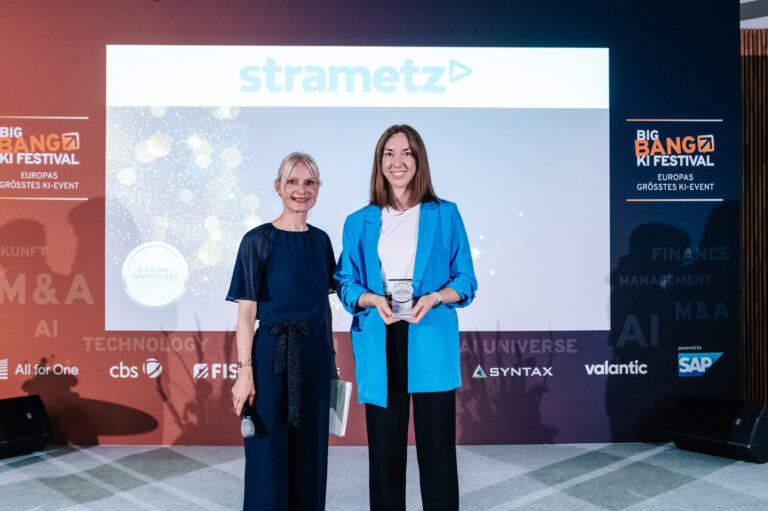What does management development look like in German SMEs?
In an increasingly globalized world, small and medium-sized enterprises – which are often still traditionally and regionally rooted – are confronted with growing challenges. In order to remain competitive in the medium and long term, it is necessary to have qualified, capable and motivated managers in the company’s own ranks. Against this backdrop, Strametz conducted a study that looked at the situation or coverage of leadership development (FKE) in medium-sized companies. The inventory is to be viewed against the background of the changed framework conditions in the world of work. The study will answer the following research questions:
- To what extent is the topic of management development implemented in the operational practice of medium-sized companies?
- What development needs can be identified?
- What are the challenges in the FKE of medium-sized companies?
The study is based on a specially designed online survey conducted in the summer of 2020. The research questions were investigated with the help of a sample comprising a total of 43 medium-sized companies (up to 500 employees). Among them are predominantly companies from industry, the skilled trades and the service sector. Participants are predominantly from management or senior HR functions.
To what extent is the topic of FKE implemented in the operational practice of medium-sized companies?
The study shows that around half of the companies surveyed do not conduct any explicit PCR or only develop executives when there is an immediate need to do so through individual, less systematic development measures. According to the companies, the primary reasons for the weak development efforts are the lack of human and time resources as well as limited structural possibilities.
Since companies tend to systematically FKE as the number of employees increases, a correlation between development activity and company size can be derived. Within the framework of the FKE, the companies surveyed develop both junior staff and already established managers in equal measure. A slightly disproportionately higher level of development activity among junior staff at companies with a declining number of employees can be attributed to potential succession planning. Primary goals in leadership development are to strengthen necessary (leadership) competencies and influence performance behavior.
The following topics are the focus of development measures:
- Project and team work
- Skills shortage
- Virtual collaboration
Primarily, the social-communicative competencies
- Communication skills
- Self management and
- Conflict Resolution Skills
be further developed. Classic development measures, including seminars, workshops and coaching, are preferred by the SMEs surveyed for skills development. What is striking here is that companies with an increasing number of employees resort to a significantly more diverse range of development measures. About half of the companies combine the measures within the framework of programs and 90% of the companies use external service providers for the development of their managers.
What development needs can be identified?
The study shows that in the medium term, companies are planning to focus on the topics of virtual collaboration, greater project and team work, and increasing competitive and innovation pressure. The topics of virtual collaboration and growing local and global insecurity and instability posted the largest percentage increases. The reasons for this are globalization and connectivity as well as the current Corona pandemic, which are considered to be a driver for the increasing importance of the topics.
In an ever-changing world of work that poses new challenges to companies and implies new demands on leadership, companies are planning in the next one to five years as part of their FKE to develop the skills
- Communication skills
- Digital competence and
- Openness to change
focus on further development.
Looking at the study, there is also a shift towards digital learning methods, such as blended learning, social learning and e-learning. Reinforcing motivators of this trend could also be the lack of human and time resources, as well as the limited structural options, according to the SMEs. With the provision of the necessary infrastructure, individual learning opportunities, in which managers increasingly take responsibility for their own learning progress and their individual competence development, thus move into the focus of future development measures. It should be noted that in addition to digital development measures, behavior-oriented development measures, such as coaching, are also becoming increasingly important. It is striking that business games Simulations, which have been shown to promote various action competencies, are not among the ten most frequently mentioned development measures, at just under 10%.
The following chart shows the top 10 development measures mentioned that will play a role in future executive development in SMEs.

n=43; multiple answers possible
What are the challenges in the FKE of medium-sized companies?
The present study was able to show that a shift from classic development measures to digital learning methods is taking place, thus following the efforts of larger, international companies. Three main challenges for medium-sized companies can thus be derived:
- Provision of the digital infrastructure
- Cultural change in the direction of “self-organized learning
- Provision of the digital learning environment and tools
Conclusion and outlook
Looking at the results of the study on executive development in SMEs, it becomes clear that digital development measures will become increasingly important in the future. All measures also focus on the development of social-communicative skills.
Seminars and coaching sessions are particularly in vogue as a way of effectively addressing the need to have qualified managers within the company’s own ranks.
Due to the high level of behavioral activation and development of action competencies, Strametz continues to see a high potential in business games and simulations (online and offline) to contribute to effective management development in medium-sized companies.
For more exciting insights, please take a look at our studies











